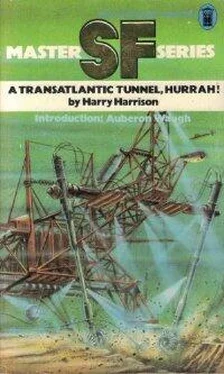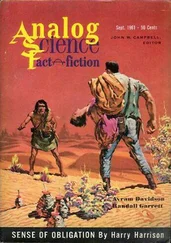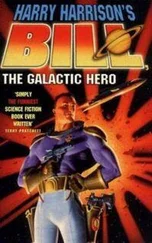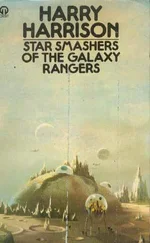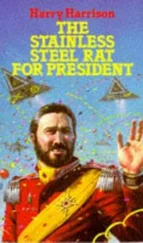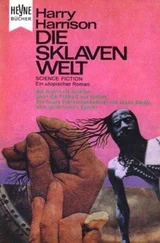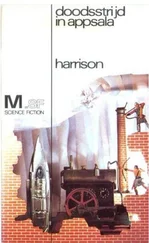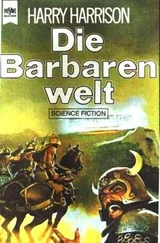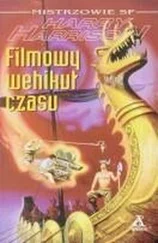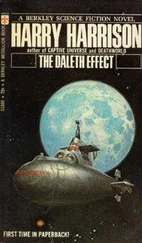Harry Harrison - A Transatlantic Tunnel, Hurrah!
Здесь есть возможность читать онлайн «Harry Harrison - A Transatlantic Tunnel, Hurrah!» весь текст электронной книги совершенно бесплатно (целиком полную версию без сокращений). В некоторых случаях можно слушать аудио, скачать через торрент в формате fb2 и присутствует краткое содержание. Год выпуска: 1972, ISBN: 1972, Издательство: Faber and Faber, Жанр: Исторический детектив, на английском языке. Описание произведения, (предисловие) а так же отзывы посетителей доступны на портале библиотеки ЛибКат.
- Название:A Transatlantic Tunnel, Hurrah!
- Автор:
- Издательство:Faber and Faber
- Жанр:
- Год:1972
- ISBN:0-571-09996-3
- Рейтинг книги:5 / 5. Голосов: 1
-
Избранное:Добавить в избранное
- Отзывы:
-
Ваша оценка:
- 100
- 1
- 2
- 3
- 4
- 5
A Transatlantic Tunnel, Hurrah!: краткое содержание, описание и аннотация
Предлагаем к чтению аннотацию, описание, краткое содержание или предисловие (зависит от того, что написал сам автор книги «A Transatlantic Tunnel, Hurrah!»). Если вы не нашли необходимую информацию о книге — напишите в комментариях, мы постараемся отыскать её.
.
Captain Augustine Washington and his team of navvies are driving a tunnel under the Atlantic in a heroic feat of construction. For Gus, a descendant of the infamous George Washington, executed as a traitor after the Battle of Lexington, this is a chance to redeem the family name.
A Transatlantic Tunnel, Hurrah! — читать онлайн бесплатно полную книгу (весь текст) целиком
Ниже представлен текст книги, разбитый по страницам. Система сохранения места последней прочитанной страницы, позволяет с удобством читать онлайн бесплатно книгу «A Transatlantic Tunnel, Hurrah!», без необходимости каждый раз заново искать на чём Вы остановились. Поставьте закладку, и сможете в любой момент перейти на страницу, на которой закончили чтение.
Интервал:
Закладка:
They had reason to hurry for already the approaching storm was raising the waves and breaking streamers of white spray from their tops. Yet they still must make haste slowly for the great whale of a tunnel section they had in tow resisted any hurried motions with its multi-hundred tonned mass. Its humped back was just awash so that the rising seas broke over it, giving it the appearance of some surfacing sea monster, gray and ominous. Finally, with careful attention and much frantic, hooting, it was brought into safe harbor behind the sea walls and secured to the waiting buoys there.
From his vantage point on the raised platform of the Control Office, Gus had a clear view of the harbor and work yards, train yards and barns, junctions and tracks, cranes and constructions, slipways and storehouses, a varied industrial landscape that was all under his control, where thousands of men labored at his bidding. It was a familiar scene now, yet he never tired of it. The radio at his elbow reported the successful tying up of the tunnel section at the same moment his eye saw the rising column of steam, the long blast that meant the tow was completed and the lines could be cast off. With this finished he lowered the powerful binoculars and wiped at his fatigued eyes, then looked around at the boom and bustle that was his life.
Riveting guns hammered and metal clanged on metal, cables squealed as great traction engines moved ponderous weights, small whistles toot-tooted as the puffing yard donkeys scurried back and forth through the maze of tracks, shunting the goods wagons about, great cranes swung as they lifted cargo from ships’ holds. The raindrops came closer and closer until they were upon him and now he was grateful for their cool touch upon his bronzed skin, for it had been a hot and close day.
Though his shirt, with the sleeves rolled up, and his puttees were made of the thinnest cotton khaki twill, the heat had still been insufferable, so that the rain was a welcome change. He even took off his topee and turned his face up to the sky so the drops splashed pleasantly upon him. Only when the shower became a torrent did he seek shelter in the office and take up a towel to dry himself. The office staff continued with their assigned tasks, except for the head ganger, Sapper Cornptanter, who now approached carrying an immense sheaf of papers.
“I have all the work reports and time sheets for all the gangs, time and hours, days sick, everything. Heap big waste of time.”
“I am forced to admit that I share your lack of enthusiasm—but what must be done, must be done.” He looked at his watch and came to a quick decision. “Have a messenger take them to my hotel and leave them at the desk so I can work on them tonight. New York is concerned about the rising unit costs and the secret of the higher expenses may well be here. I’ll go over them this evening and see if I can prize out the nugget of truth from this dross of statistics. In fact I shall leave now before the shift ends so I won’t be trampled underfoot.”
“Making tunnels is thirsty work in this climate. Navvies need plenty beer, wine, red-eye to keep going.”
“A point I’ll not argue. You know where I’ll be and what to do.”
The quick storm had almost passed as he picked his way across the yards, the last drops clattering on his topee. He needed his knee-high engineer’s boots here for the mud was constantly churned up by the heavy lorries. Reaching Avenida Atlantica, the wide street that ran along the shore, he strolled down it, blending with the heterogeneous crowd that was now making its appearance after the warm afternoon siesta. He enjoyed this time of day, this parade of people from every walk of life, from almost every corner of the world, for it was his tunnel that had turned the sleepy little sub-tropical city of Angra do Heroismo, on the island of Terceira in the Azores, into the bustling, brawling, international port it had become.
Of course the off-shift navvies were there, from both sides of the Atlantic, handsome in their scarves and colorful waistcoats, high boots and great hats, pushing their way through the pack and giving ground to no man. The olive-skinned islanders seemed in a minority here, but they did not complain because prosperity was now their lot, a prosperity never known before when fish were the only profit they took from the sea, not tunnelers’ wages. Once the cash crops of pineapples and bananas, oranges, tobacco and tea were sold on a perilous world market. Now these products were consumed locally with great enthusiasm, so that little or none had to be shipped abroad.
Nor were the navvies the only customers of local goods, for where the tunnel went and the money from the men’s pay packets, there went as well men and—alas!—women who had designs upon that money, whose only ambition in life was to transfer as much of it as possible from the purses of the honest working men to depths of their own sordid wallets. Gamblers there were in the crowd, sleek men with dark clothes, neat moustaches and white hands—and ready derringers about their persons to confront any man so rash as to dispute the honesty of a deal or the fall of a pair of dice. Money lenders there were, who had ready cash at any time for any man gainfully employed, who exacted such immense sums in interest, three and four hundred percent not being uncommon, that the biblical injunctions against usury easily could be understood.
Merchants came, too, not men of established business who displayed their wares in public and stated their price clearly, but gray men with folding boxes and velvet bags in secret pockets, who produced rings and watches, diamonds and rubies at ridiculously low prices, inferring, or whispering, that the goods were lava , hot that is, stolen that is, though it would take an insane thief to steal such poor wares, for the rings turned green, the watches stopped ticking when the roaches inside them died, the diamonds and rubies fell to smithereens of glass if dropped.
And there were women, oh yes, hapless creatures of the night, betrayed, stolen, enslaved, entrapped, doomed to a life of hell that does not bear describing on the printed page lest the ink that forms the words grows warm, then scorching hot enough to burn the letters from the paper, for the eye of the gentle reader dare not behold the facts of such as these and the trade they plied.
All these were upon the sidewalks this afternoon, and more as well, Moorish traders come with dhows from Africa and Iberia bringing food, for the few islands of the archipelago could not produce enough for the great numbers of men based here, dark-skinned, hawk-nosed men in white burnooses who paced the pavement with firm tread, hands resting on cruel knives, interested in this strange outpost of the alien Christian. An occasional frock-coated man of business could be seen, for much business was conducted here, proceeding incognito in his uniform clothes so the observer could not tell if he were French or Prussian, Russian or Pole, Dane or Dutch. And more, and more they passed in an ever changing, never changing, flood of humanity.
Gus always enjoyed the show and when he came to his favorite establishment, the Tampico, he turned in and sat at a table on the porch, just a few feet above the street, resting his arm on the thick brass rail that surrounded it, waving to the bowing owner and smiling at the rushing waiter who was bringing a chilled bottle of the local wine he favored, vinho de cheiro , a delicately scented, sweetly flavored wine that had the taste and smell of roses. He sipped at this and felt at peace. The work went well, there was nothing to complain about. But as he watched the crowd he was aware, out of the corner of his eye, of someone sitting at the next table, back to him, moving very close. That this arrangement was not accidental was made manifest when the man, for it was a man, spoke in a low voice that only Gus could hear.
Читать дальшеИнтервал:
Закладка:
Похожие книги на «A Transatlantic Tunnel, Hurrah!»
Представляем Вашему вниманию похожие книги на «A Transatlantic Tunnel, Hurrah!» списком для выбора. Мы отобрали схожую по названию и смыслу литературу в надежде предоставить читателям больше вариантов отыскать новые, интересные, ещё непрочитанные произведения.
Обсуждение, отзывы о книге «A Transatlantic Tunnel, Hurrah!» и просто собственные мнения читателей. Оставьте ваши комментарии, напишите, что Вы думаете о произведении, его смысле или главных героях. Укажите что конкретно понравилось, а что нет, и почему Вы так считаете.
